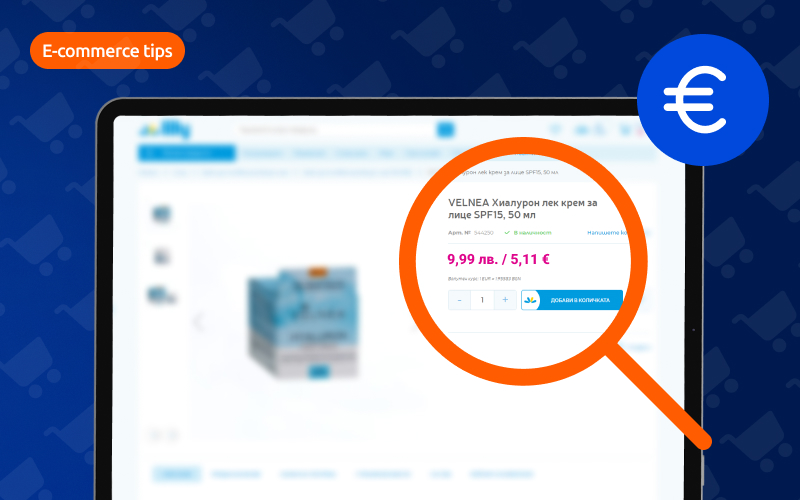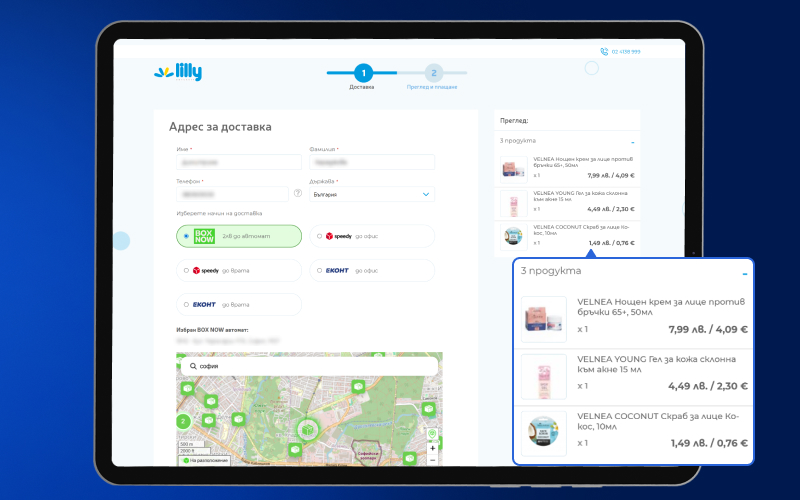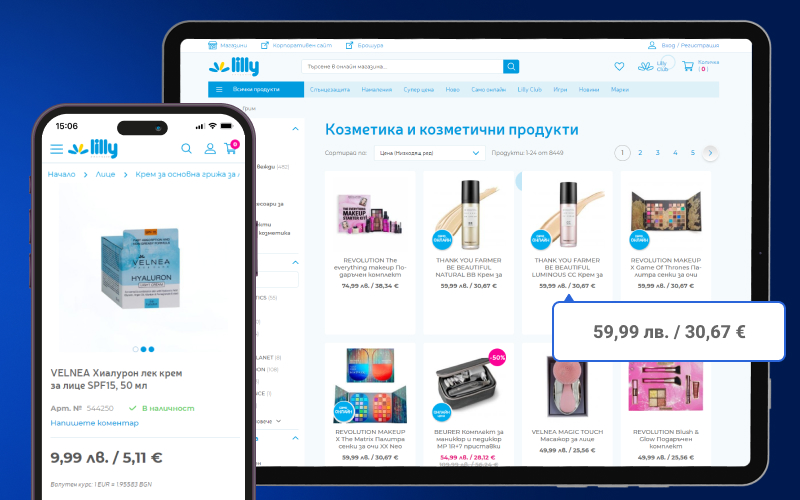What should you know as an online merchant about the transition to the euro?
18.08.2025 10 min. 4564 views
As of January 1, 2026, the euro will become the official currency in Bulgaria. All online stores are required to implement dual price display in BGN and EUR starting from August 8, 2025 (with a grace period until October 8, 2025). This applies to all key areas in the e-store: product pages, categories, cart and checkout, promotions, emails, invoices, shipping costs and fees, loyalty program prices, marketing feeds, and more. Preparation requires technical updates to the eCommerce platform and integrated systems (ERP, CRM, courier modules, payment tools), as well as updates to custom functionalities that use pricing.
This change, unprecedented in scale for businesses, requires careful and timely preparation by all merchants, whether operating physically or online.
At Stenik, we are already actively working on planning and implementing the necessary changes in compliance with regulatory requirements to ensure a smooth transition for all our clients whose online stores we maintain and develop.
This article will cover key dates, legal requirements, and specific steps you need to take to prepare your online store to operate with the euro.
The content in this article is for informational purposes only. We advise consulting with competent professionals to ensure you comply with all legal requirements. These are outlined in the National Plan for the Introduction of the Euro in Bulgaria, available on the Ministry of Finance's website.
Key dates for the euro transition in Bulgaria (as of now)
- July 8, 2025: The European Parliament approved Bulgaria's accession to the eurozone, and the EU Council decided to introduce the euro in the Republic of Bulgaria.
- August 8, 2025: Mandatory dual price display in all sales and advertising channels. The official currency remains BGN, but prices must also be displayed in their euro equivalent.
Important: Although the official start date is August 8, 2025, a grace period until October 8, 2025 has been granted to allow businesses extra time to adapt their communication and technical systems to display euro equivalents. - January 1, 2026: Introduction of the euro as the official currency in Bulgaria. A dual circulation period begins — for one month, both BGN and EUR can be used for payments.
- February 1, 2026: All payments in the country will be conducted in euros only.
- Until August 8, 2026: Dual price display continues. BGN equivalents of prices will be shown in the same way that euro equivalents must be shown until the end of 2025.
- From August 9, 2026: Mandatory dual price display ends.
What does the law (ZVERB) require from online merchants?
ZVERB = The Law on the Introduction of the Euro in the Republic of Bulgaria is the primary legal act regulating the transition from BGN to EUR. It defines the rights and obligations of all parties involved — merchants, banks, state institutions, and consumers.
ZVERB outlines specific obligations for businesses (including in e-commerce), requiring significant changes to online stores. Here's what you need to know if you're an online merchant:
1. Mandatory dual price display (from October 8, 2025):
Prices for goods and services must be displayed simultaneously in BGN and EUR. Conversion is based on the fixed exchange rate of 1 EUR = 1.95583 BGN. This measure aims to prepare consumers for the change, ensure transparency, and prevent speculative price increases.
Where must dual price display be implemented in e-stores?
- Product pages: mandatory dual display of the final (sale) price. For other prices (old price, RRP, third-party pricing, and other custom prices) — dual display is optional but not mandatory.
- Categories and product lists.
- Search results.
- Product blocks (including custom modules and external sources).
- Promotional banners, emails, and promotions.
- Cart, mini cart.
- Checkout page.

* This image is an example from a project implemented for our client Lilly Drogerie, illustrating dual pricing on the checkout page.
- Wishlist.
- My orders / order history.
- Pop-ups and other elements.
- Shipping cost and additional fees.
- Prices after applying promo codes/rules.
- Blocks such as: "You are X BGN/EUR away from free shipping," "You save X BGN," "Buy 2 and save %," etc.
- Fees, leasing calculators, and other external modules.
- Transactional emails.

* This image is an example from a project implemented for our client Lilly Drogerie, illustrating dual pricing in the order confirmation email.
- Invoices, packing slips, shipping documents, and other paperwork.
- Product widgets, cross-sell, upsell, related products.
- Loyalty program prices (including accumulated values and thresholds).
- Feeds for Google, Meta, and other channels.
Other important notes:
- If your online store uses external tools (e.g., product recommendation engines or email marketing) that display prices, these must also comply with the law.
- While dual price display is only mandatory for the final price, this price may vary by customer group (e.g., loyalty members).
- Dual price display in B2B commerce is not mandatory by law — the requirement applies only to B2C merchants. However, some B2B merchants may choose to implement it to simplify things for their customers.
2. Equal display of both currencies:
Prices in BGN and EUR must be placed next to each other, displayed clearly and legibly, and use the same font size, style, and color. Currency symbols must be the same size as the digits. Recommended format:
59.99 BGN / 30.67 EUR

* This image is an example from a project implemented for our client Lilly Drogerie.
3. Conversion using the fixed exchange rate:
Currency conversion is done only using the official fixed rate of 1 EUR = 1.95583 BGN. The legislation specifies rounding rules: the amount in EUR is rounded to the second decimal place using standard mathematical rules.
- If the third decimal digit is less than 5
Example: 127.45 BGN / 1.95583 = 65.164... → 65.16 EUR - If the third decimal digit is 5 or greater
Example: 248.80 BGN / 1.95583 = 127.209... → 127.21 EUR
4. Obligations after the euro becomes the main currency (from January 1, 2026):
From this date, the primary currency in the online store must be euro, and BGN will be shown as additional information until August 8, 2026.
5. Ban on unjustified price increases:
During the dual price display period, merchants are not allowed to increase prices without objective economic justification. The Consumer Protection Commission (CPC) and the Bulgarian National Bank (BNB) will monitor compliance.
How to prepare your online store for the euro?
Timely preparation is key. The earlier you start, the smoother the transition will be. Create a detailed plan that covers all aspects of your business.
1. Technical preparation of your online store and systems
- Update your e-commerce platform: Ensure that your store's platform supports multiple currencies and is technically ready for the euro transition. This includes:
- Changing the system's default currency;
- Supporting dual price display (BGN and EUR);
- Correct VAT handling in the new currency;
- ERP synchronization;
- Updating courier modules, payment tools (including leasing), and other external integrations;
- Adapting feeds for marketing platforms and other tools;
- Repricing if prices aren’t auto-updated from ERP;
- Updating all custom functionalities involving pricing or currencies.
- Update your payment systems: Contact your payment service providers and accounting software vendors to ensure they can process payments in euros from January 1, 2026. They should also support dual pricing and be able to issue invoices in EUR.
- Coordinate with your ERP/CRM providers: Ensure that your systems can operate with prices and orders in EUR from the transition date.
- Test thoroughly: Assign a team to test all changes in your online store before and after the euro transition.
3. Customer communication and marketing
- Inform your customers: Use banners, FAQ sections, emails, and social media to communicate the upcoming change.
- Coordinate with your marketing agency: Ensure all price-containing materials (ads, product descriptions, banners, emails) are updated accordingly.
4. Consumer protection
The state has introduced safeguards to prevent speculative price increases during the transition. CPC and NRA will monitor price changes to ensure they're based on valid economic reasons.
Conclusion
The euro transition is a historic and strategic milestone for every online merchant in Bulgaria. To avoid technical strain, operational risks, and possible penalties, start preparations early and plan carefully. We hope this overview of key requirements helps you avoid fines, customer confusion, and potential disruptions.
With consistent actions, a clear strategy, and the right technical and marketing adjustments, you can ensure a smooth transition and maintain customer trust.
The Stenik team is already working with clients to prepare their Magento stores for the new currency. We've established a structured process that guarantees legal compliance and technical stability.
FAQ

